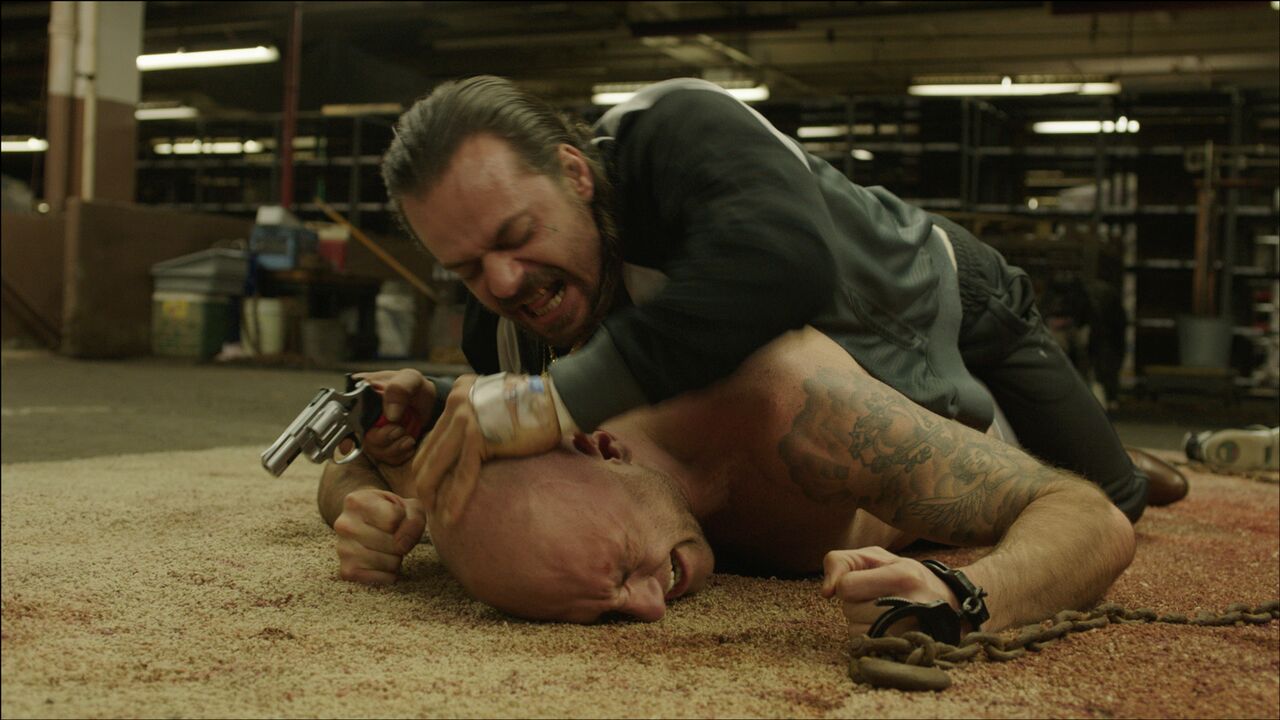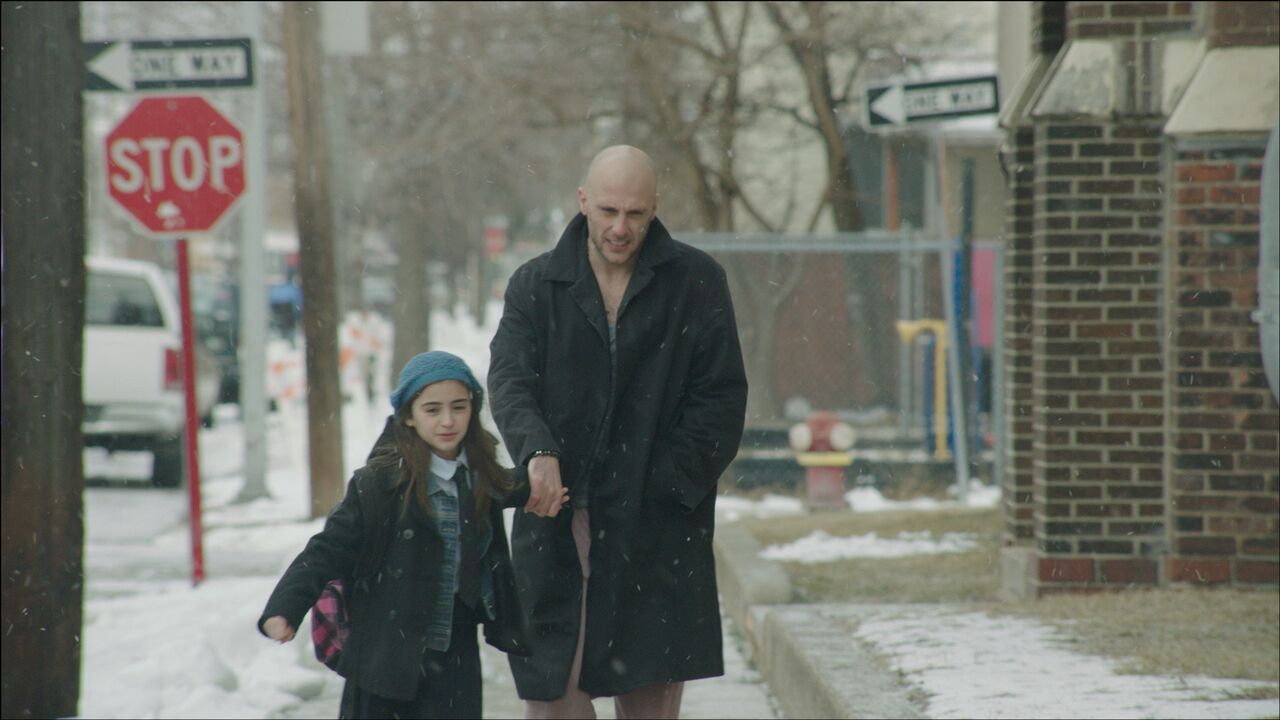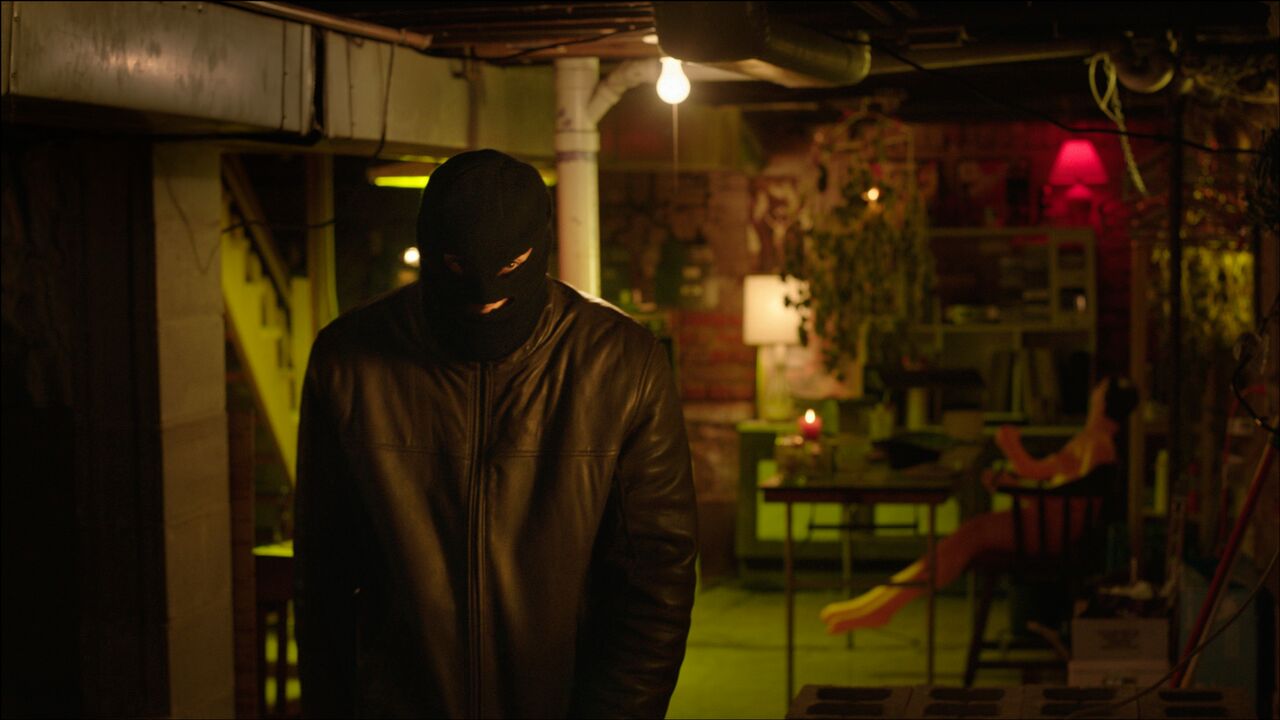Cash Only
 Scott Pfeiffer
Scott Pfeiffer  Monday, May 9, 2016 at 12:32PM
Monday, May 9, 2016 at 12:32PM 
This suspenseful indie crime film grabs you by the lapel at once and barely lets go. While I have some misgivings--I think its final act is a misstep--it sates your thriller jones. While I don't actually bite my nails, this picture had me eyeing them anxiously.
Nickola Shreli plays the memorably-named Elvis Martini, a Detroit slumlord. Set amidst the working-class Albanian community, the film was written by Shreli himself and directed by Malik Bader ("Crush," "Street Thief"). While I didn't buy everything in Shreli's screenplay, I bought his performance completely. There's a reason it feel so authentic: the character of Elvis is based on his own experiences as a Detroit landlord. (Whether or not, like Elvis, he had had to put a piece in his back pocket before going out to collect the rent on his various properties, we do not know.)
"Cash Only" is good at economical character development. There's a moment that illustrates what I mean. Elvis is in trouble with money as usual. (Bill collectors darken his doorstep, in the form of the neighborhood bookie, a priest asking after his daughter's tuition, etc.) He tries to get firm with a tenant, who happens to be a lady of the night. He's let her slide for months, but now he really must insist she pay the rent on her seedy room. Desperation flits about his eyes. While he's a big man with a shaved head, we can see he really has no appetite for playing the tough guy. From her "you've got to be kidding me" eye-roll, we can infer a few things more. One, the room's not worth paying for. Two, landlord and tenant perhaps had some kind of "arrangement," if you take my meaning. And three: she doesn't take him seriously in the slightest.

Elvis is tormented by a tragedy of his own making. In the movie's opening moments, we see him at a bar, and in the next instant he's hurtling down the street, bursting into his own apartment, dousing the couch, and setting the place ablaze. He left his phone and drink on the bar--that's his alibi. Thing is, he hadn't counted on his wife getting home early and lying down for a nap; doesn't get her voice-message until he's back at the bar. (In a nice detail, he still uses a flip-phone.)
Killing his wife in an astonishingly boneheaded insurance-fraud scheme doesn't really seen to teach Elvis anything. He's still as feckless as ever when the story picks up some months later. He does, at least, have the good graces to feel guilty about it. It's an achievement of the film that we somehow sympathize with the big galoot, nonetheless. Is he a bad man? Not really. It's more like he has a weakness for life's temptations, and his weakness boxes him in.
As a bedtime ritual, Elvis's little girl, the apple of his eye, occasionally dials the dead woman's number, just to hear mommy's voice on her voicemail greeting, and to leave her updates on how their lives are going. (The bar alibi must have held up, though Elvis' enemies seem to know the real story; they use it to torment him).
Elvis believes himself to be just a little smarter than the 'hood, and, in fact, he is a bit brighter, or at least less provincial, than most of the people around him. In his ill-advised wager that he'll always be able to dance just a little bit faster than the neighborhood's two-bit hoods, Elvis recalls Cosmo in Cassavetes' "The Killing of a Chinese Bookie," or Charlie in "Mean Streets." Unlike his pals, he is more likely to be amused and curious about difference than offended by it. There is a scene in which Elvis is tickled by his interactions with one of his tenants, a rather fabulous gay man from a more affluent, educated background (an "urban explorer," I suppose), while his friend, the building's odd-job fixit man (Herion Mustafaraj), stands by looking gobsmacked.

Elvis's shabby building is the kind of place that has surveillance cameras inside the rooms. He occasionally shoots a desultory glance over at the bank of monitors from the couch, as if watching TV. Some of the tenants seems to be half-performing for him, undressing languidly.
The building's denizens include a gruff, gaudy, kindhearted woman who occasionally babysits his daughter. There is a claque of old Albanian ladies, and a party girl (Danijela Stajnfeld) who, while married, happily tosses Elvis some "benefits." (He characterizes this reckless affair in terms of "helping out" some tenants.) Bader himself has a funny turn as a demented pot dealer, Kush, who grows in the basement of one of Elvis's dilapidated buildings, cooing to his plants as if they are his honeys.
One day while glancing at the monitor, he spots the recalcitrant hooker appear to stash something interesting away. Rummaging through her property, he comes upon her little secret: a big bag of money! Well, this is problem solved. He will simply put the woman out, keep her money, pay off his debts, and forget about it. What could possibly go wrong? Soon, he finds himself in receipt of rather disquieting phone calls. A shiver-inducing voice advises Elvis that he now has "big problem." His response to clear and present danger? To smoke up with Kush and have sex with the upstairs neighbor.
(Bader is good at interweaving the "personal" camera into his storytelling style: I think of the moment we spot the neighbor's bottom half flouncing about at the top of the stairs, from Elvis' point of view.)
A conk on the head later, and when he comes to, he discovers his daughter has been kidnapped. From the other end of the phone, his misfiring synapses perceive a demand: cough up $25,000 by midnight, or your daughter gets it. What follows is truly gripping stuff. There is queasy pleasure in watching this man flail, with the stakes life-or-death. He's managed to alienate almost everyone in a position to help him out with money. When he suddenly hits on a scheme to raise the cash, it's either really stupid or really smart, and either way crazy--but it just might work.
And then he comes face-to-face with true evil, in the person of a depraved dogfighting gangster, devilishly played by Stivi Paskoski. The filmmakers send the sinner, Elvis, to hell, subjecting him to the kind of pain he perhaps deserves. The tonal shift into horror jars, though, and it's a bit below the belt to bring a child into it. (Caged like a dog, his daughter must watch while he is brutalized.) This scene posits redemption through violence, giving us a demon-purging catharsis, a bloody release. It's a hit to the reptile brain for the audience, satisfying and kind of cheap.
Shreli knows these streets, these rooms, these ethnic working-class people. Indeed, I wish the film had gone further in the direction of certain of its strengths, such as its skill at evoking the Detroit demimonde and its colorful neighborhood characters. It could have made more of its feel for the way that vestiges of the old country play out in the day-to-day lives of the sons and daughters of immigrants.
We root for Elvis, though, despite--or perhaps because of--his flaws. He's got heart, tenderness and soul. Despite the flaws in the movie itself, Shreli and Bader have made a cracking, urgent crime thriller, scrappily shot on a shoestring, and fueled by adrenalin and guilt.
(89 minutes)
Cash Only is available on VOD starting May 13, 2016.
Rating: ***
Key to ratings:
***** (essential viewing)
**** (excellent)
*** (worth a look)
** (forgettable)
* (rubbish!!)


Reader Comments